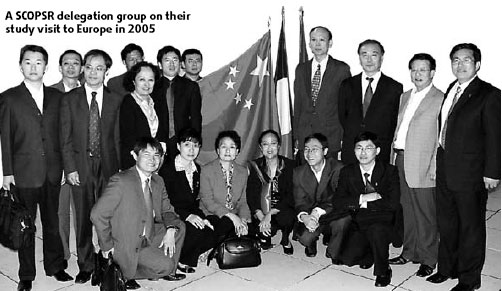EU experience enriches China's civil servants

The China-Europe Public Administration (CEPA) Program started at the end of 2003 and will close its first phase at the end of this year.
Satisfied with its achievements, China and the European Union (EU) have decided to launch the second phase of the program in 2009.
The overall aim of the program is to provide assistance to China's economic and social reform and increase understanding and exchange of public administration knowledge between China and EU.
Major beneficiaries of the program are the China National School of Administration (CNSA), the Provincial Institutes, the Ministry of Personnel (MOP) and the State Commission Office for Public Sector Reform (SCOPSR).
The program is mainly funded by the European Commission and co-financed by the Chinese government.
On the European side, the program is implemented by a consortium of seven partners led by the European Institute of Public Administration (NL).
More specifically, it focuses on the development of CNSA's scope of influence and the links between MOP, SCOPSR and their counterparts in Europe.
The CEPA program consists of six components, each with specific objectives. They are:
Developing an annual forum for strategic policy;
Developing training modules and a distance learning system to support the master of public administration (MPA) program;
Contribution of training modules on EU experience in public management and administration;
Training management and trainers;
Development of CNSA's staff and institutional assessment program;
Developing Chinese-European public administration networks.
Almost 3,000 people have participated in activities in China, while 37 people made short-term and 25 made long-term study visits to Europe.
Three senior forums have been held in Beijing, where European experts have shared their knowledge and experience with their Chinese counterparts.
Meanwhile, programs on training methodology and management have been delivered and methods for institutional and staff assessment devised.
The project has translated a number of European publications on public administration and public management that were of significant impact or of special interest.
Through intensive contact between both sides in different areas of public administration, public management and relevant training, the CEPA program has brought mutual benefit and contributed to an ongoing process of improving the performance of the public sector.
 print
print  email
email  Favorite
Favorite  Transtlate
Transtlate 
The China-Europe Public Administration (CEPA) Program started at the end of 2003 and will close its first phase at the end of this year.
Satisfied with its achievements, China and the European Union (EU) have decided to launch the second phase of the program in 2009.
The overall aim of the program is to provide assistance to China's economic and social reform and increase understanding and exchange of public administration knowledge between China and EU.
Major beneficiaries of the program are the China National School of Administration (CNSA), the Provincial Institutes, the Ministry of Personnel (MOP) and the State Commission Office for Public Sector Reform (SCOPSR).
The program is mainly funded by the European Commission and co-financed by the Chinese government.
On the European side, the program is implemented by a consortium of seven partners led by the European Institute of Public Administration (NL).
More specifically, it focuses on the development of CNSA's scope of influence and the links between MOP, SCOPSR and their counterparts in Europe.
The CEPA program consists of six components, each with specific objectives. They are:
Developing an annual forum for strategic policy;
Developing training modules and a distance learning system to support the master of public administration (MPA) program;
Contribution of training modules on EU experience in public management and administration;
Training management and trainers;
Development of CNSA's staff and institutional assessment program;
Developing Chinese-European public administration networks.
Almost 3,000 people have participated in activities in China, while 37 people made short-term and 25 made long-term study visits to Europe.
Three senior forums have been held in Beijing, where European experts have shared their knowledge and experience with their Chinese counterparts.
Meanwhile, programs on training methodology and management have been delivered and methods for institutional and staff assessment devised.
The project has translated a number of European publications on public administration and public management that were of significant impact or of special interest.
Through intensive contact between both sides in different areas of public administration, public management and relevant training, the CEPA program has brought mutual benefit and contributed to an ongoing process of improving the performance of the public sector.
Education News
 more
more- Confucius Institutes promote exchange between China
- New version of eye exercises for Chinese students
- Teaching "respectable" but "arduous" job in China
- China Anecdote: 13 years old graduate student in
- Overseas students focus on China as their destination
- China drafts 12-year guideline for education reform
- Chinese lawmaker engage to youngster education
- American Schools embrace Mandarin
Education Outlook
Top University In China: FUDAN
Initially known as "Fudan Public School", Fudan University
Top University In China: NJU
Nanjing University, one of China's key comprehensive
Top University In China: SJTU
Recommendation
Weifang University
Weifang University which is approved by the Ministry of Education as
Zhejiang University of Science and Technology (ZUST)
Zhejiang University of Science and Technology (ZUST) is a full-time
Xi'an University of Architec-ture and Technology
The university has been authorized by the State Council to set





